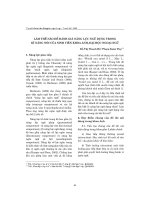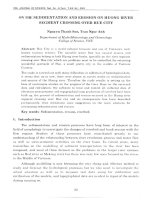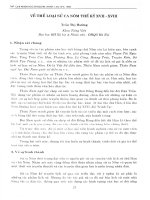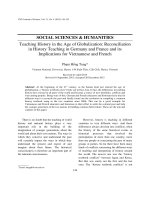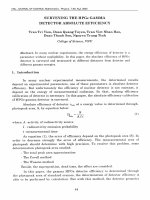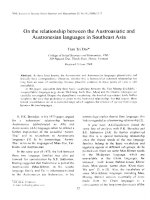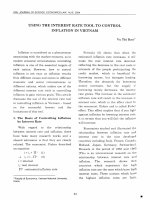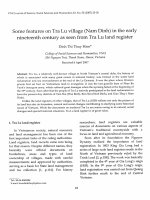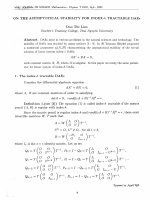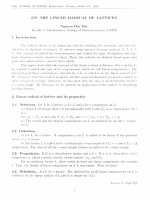DSpace at VNU: Settling the past, building a better future: reconciliation in history teaching in Germany and France
Bạn đang xem bản rút gọn của tài liệu. Xem và tải ngay bản đầy đủ của tài liệu tại đây (4.14 MB, 8 trang )
VNU Journal of Science, Social Sciences and Hum anities 23, No. 5E (2007) 31-38
Settling the past, building a better future: reconciliation in
history teaching in Germany and France
Pham Hong Tung*
Vietnam National University, Hanoi
R eceiv ed 7 N o v em b er 2007
A b stract. In th is article th e a u th o r p ro v id es an o v erv iew of th e reconciliation in teach in g national
h isto ry b etw e en G e rm a n y an d France. T he process w as started w ell before the Second W orld W ar.
H ow ever, it b ecam e fru itfu l only after th e en d of the C old W ar th a n k s to th e in itiativ es of the
French an d G e rm an Y outh P arliam en t. T he a u th o r h ig h tlig h ts th e role of bo th F rench a n d G erm an
ed u c ato rs a n d h isto ria n s as w ell as th e su p p o rt of G e rm an a n d F rench G o v ern m en ts, p articu larly
th e G erm an P rim e M inister G e rh a rd Schoeder an d the F rench P resid en t Jacque C hirac.
N ev ertheless, th e a u th o r also po in tes o u t th e G erm an an d F rench h isto rian s a n d ed u c ato rs try to
settle th e d is p u tin g issues co ncerning their o w n national histories, b u t fully forget th e reconciliation
in teach in g E u ro p e an h isto ry an d colonial p ast of the form er colonial em pires.
than one people or concerning the past OÍ
m any g ro u p s or parties. So far there have
been m any kinds of conflicts concerning the
different w ays of teaching and interpreting of
history aro u n d the w orld. The new est one
w as the "history textbook conflicts" betw een
Japan and Korea. But that w as surely not the
first and the last ones. The "history textbook
conflicts" is not only the problem of the Eastand Southeast A sian countries. It is also not
only the problem s betw een the form er
"m otherlands" and form er colonies. In fact it
has been a problem am ong m any countries
aro u n d the w orld. Hence, each conflict has its
ow n n atu re and characteristics, consequence
an d solutions.
G erm any and France are the tw o biggest
and m ost im p o rtan t countries in central
Europe. D ue to the strategic im p o rtan t role of
the tw o countries, there w ere m any conflicts,
There is no d o u b t th at the teaching of
w orld history and n ational history plays a
very im portant role in the b u ild in g of the
im agination of y o u n g er generations about the
w orld and about their ow n nation. The w ays
in w hich they conceive an d u n d erstan d the
past will certainly im pact the w ays in w hich
they un d erstan d the p resen t an d expect of
and im agine about their future. The historical
consciousness is therefore an im p o rtan t part
of the national consciousness.
H ow ever, history is teaching in different
countries in very different w ays. A nd these
differences alw ays d ev elo p into conflicts,
w hen the history of the sam e historical events
or historical processes th a t involved the
participation of m ore th an one country, m ore
’ C o rre sp o n d in g a u th o r. Tel.: 84-4-8587590.
E-mail: tu n g p h @ v n u .ed u .v m n
31
32
Pham Hong Tung / V N U Journal of Science, Social Sciences and Humanities 23, No. 5E (2007) 31-38
even bloody w ars betw een the tw o peoples in
the history. Therefore, w orld
history,
European history and national histories had
been teaching in very different w ays in the
tw o countries. In its turn, the difference in
history teaching had also becom e a source of
hostilities betw een the tw o people for a long
tim e in the past. H ow ever, m any generations
of French and G erm an historians and
educators have been aw are of these and tried
their best to find o u t the w ays for
reconciliation in teaching history in the tw o
countries, so that to contribute to the
reconciliation betw een the tw o peoples.
Finally, a com m on history textbook w as
published in 2006 for using in both countries.
This textbook is on the one han d a result of a
long lasted reconciliation process. O n the
other hand it m ay be considered as a good
exam ple for reconciliation in history teaching
in other countries and region. That is the
reason for this study.
Like in any other social science, the
existence of m any different m ethods,
approaches, interpretations, explanations,
presentations, theories, ideas and opinions
am ong historians is a quite norm al and
healthy fact. To ask the historians in different
countries, of different tim es and of different
cultures to think, w rite and speak sim ilarly is
really to require an im possible thing. This is
the idea of the fam ous Polish historian Johann
M artin C hladenius(1). But this does not m ean
that it is absolutely im possible to find o ut the
right w ays to reconcile conflicts, to reduce the
(1)
In
his
famous
work
"Allgemeine
Geschichtswissenschaft", Schladenius wrote in 1752: "It is a
big mistake of the ones, who required, that the historians
should express their attitude like a man without religion,
fatherland, family. Those people do not know, that they are
requiring the impossible things" [1, p.15-16].
differences and to overcom e the gaps amorig
historians. Certainly, th at is nevertheless no
sim ple task.
E uropean historians, governm ent and
various social and cultural organizations as
w ell as educators have been aw are of this task
quite early. A ccording to Prof. Phillipe
A lexandre, the first initiatives in revising and
reconciling the difference in teaching of
history in schools in E uropean countries w ere
started already in 1849 by the Peace Congress
in Frankfurt, G erm any. The Congress called
u p o n its m em bers in different European
countries for com m on efforts to erase
prejudices and hostilities by education of the
y oung generation, particularly by history
teaching, so that prevent the outbreak of w ars
in the future. A lthough this initiative was
unsuccessfully, b u t for the first Lime, it
launched out the question of reconciliation in
education in E urope [2, p.2].
In 1900 the Peace M ovem ent held a W orld
Peace C onference in Pest (Bulgaria) w hich
issued a fam ous call for revision and
reconciliation in history teaching in European
countries. The Conference considered this as
one of m ost im p o rtan t w ays to keep the peace
in Europe. Thus, it event m ade a step further
by giving four "suggestions" w hich can be
considered as m ain principles for revision
and reconciliation of history teaching [2, p.34]. H ow ever, before the First W orld W ar the
initiatives and engagem ents for reconciliation
of history teaching w ere m ainly approached
as a p a rt of the peace m ovem ent. The
participation of E uropean educators and
historians in these efforts w as still really w eak
and no governm ent seem ed to be really
engaged w ith the m ovem ent.
A fter
the
First
W orld
W ar
the
reconciliation effort w as restarted - this tim e
Pham Hong Tung / V N U Journal of Science, Social Sciences and Humanities 23, No. 5E (2007) 31-38
by the League of N ations and therefore w ith
the participation of m any E uropean states. It
w as in this tim e th at the revision of history
textbooks becam e the focal p oint of all
reconciliation discussions. An international
conference w as o rg an ized in 1924 in Lyon
(France) by the L eague of N ation, in o rder to
discuss about the w ays to set up regulations
for revision of history textbooks and to
im prove the history teaching in European
countries. After that, there w ere som e m ore
conferences and initiatives trying to solve the
conflicting
ideas,
p resentations
and
interpretations in history textbooks using in
different E uropean countries.
The French an d G erm an historians and
educato rs played in these efforts the m ost
im p o rtan t role, because am ong all European
countries there existed betw een France and
G erm any large g ap s in teaching history.
D espite of all efforts of the League of N ations
and
of
m any
h is to ria n s
fro m
d iffe re n t
countries the reconciliation w as finally ended
w ith o u t any success. The G erm an delegates
argued
th at
the
G erm an
federation
g overnm ent has no control p ow er over the
history teaching in different G erm an states,
w hile the French delegates said th at the
French G overnm ent w an ted to g u aran tee the
teacher w ith th eir right of free choices for
textbooks. A dditionally, G erm an professors
and
p oliticians
p o in te d
o u t th a t the
regulations for revisions of history textbooks
laid dow n by the Lyon Conference w ere
u n ju st and conflicting w ith the G erm an
constitution. In fact, all this originated from
the Versailles A g reem en t of 1919, in w hich
only G erm any, as a defeated country, was
accused for the o u tb reak of the First W orld
W ar and w as p u n ish e d for that. T hat was
exactly w h at the G erm an educators and
33
historian considered as historical distortion
by the League of N ations and could not
accept in their teaching.
P e r h a p s t h e o n l y p o s i t i v e o u t c o m e OỶ all
reconciliation efforts in Europe before the
Second W orld W ar w as the beginning of the
cooperation betw een French and Germ an
educators
and
historian.
A lready
in
D ecem ber 1925 the SNI (Syndicat National des
Institutrices et lnstituteurs de France et des
Colonies) organized a m eeting betw een French
and G erm an educators in Paris to discuss
about the reconciling issues in history
teaching in the tw o countries. Some
principles w ere suggested
for further
reconciliation[2,p.9-10].
In
1928
French
historians and G erm an historians m et
together again in Oslo (N orw ay) by the Sixth
International Conference of the Historians.
A lthough they did not go in concrete
conflicting issues concerning the First W orld
W ar, b u t they discussed about the w ays of
reconciling in history teaching, in order to
elim inate the hostilities betw een the tw o
countries in history teaching [3,p.3]. Seven
years later, in N ovem ber 1935, tw o Germ an
professors, H erre and Reim an, w ent to Paris
to discuss w ith French historians about the
possible w ays to settle the conflicting issues
concerning the history of relations betw een
the tw o countries. At the end, they p u t
forw ards '*40 advises" that w ere to send to all
history teachers and authors of history
textbooks in the tw o countries to help them
by reconciling of conflicting issues. But their
"advises" w ere delivered w idely only in
France. In G erm any, the situation became
m ore and m ore extrem ely difficult for any
reconciling effort, because the H itler regim e
w as calling for a "total w ar" to extend the
"Lebensraum" (Living Room) of the arias[3,p.l0].
34
Pham Hong Tung / V N U journal of Science, Social Sciences and Humanities 23, No. 5E (2007) 3Ĩ-38
After the Second W orld W ar, the
reconciliation efforts w ere restarted in 1950s
in Europe w ith the su p p o rt of UNESCO. Six
conferences of E uropean historians w ere held
in G erm any and other E uropean countries to
discuss about the revision of history
textbooks and reconciliation of history
teaching.
At the central p oint of these conferences
was the reconciliation of history teaching
betw een G erm any and France, the tw o
biggest countries in E uropean continent w ith
so m any unsolved conflicts in the history. In a
conference
in
Freiburg
(in
Breigaus,
Germ any) in 1951 G erm an an d French
historians decided to accept again the "40
advises" of the m eeting in Paris in 1935 as
principles for revision of the history
textbooks and for the presentation of the
history of the relations betw een the two
countries [13,p.l2]. In the follow ing years, 14
other m eetings betw een French and G erm an
historians w ere held, until they decided to
break the conference series in 1967. In 1981,
on the suggestion of the G erm an GeorgEckert Institute, the m eeting series was
restarted and seven conferences of G erm an
and French w ere organized until the end of
the Cold W ar (1989).
In those tw o conference series the G erm an
and French historians had tried their best to
settle
m any
conflicting
issues
and
interpretations in teaching of the history of
Europe, history of the G erm an-French
relation and the geographical changes of the
tw o countries in the history. Of course there
had been certain issues th at they could found
no
possible
w ay
for
reconciliation,
particularly the issues concerning the G erm an
occupation of France and the collaboration of
the Vichy regim e d u rin g the Second W orld
War. But in general, these efforts of the
French and G erm an historians and educators
after the Second W orld W ar w ere really
fruitful. They had discussed very frankly and
thoroughly about the w o rk in g principles, the
organization of French - G erm an history
textbook com m ission, the topics to be
exam ined and revised and then about the
concrete "advises" for settling the conflicting
issues. Step by step they p u t forw ards their
efforts, issued m any valuable "advises" for
history teachers and school textbook authors
in the
tw o countries,
and
therefore
contributed greatly to reconciliation of
history teaching in France and in G erm any.
Surely, u p to now the state relation betw een
France and G erm any has not developed
w ithout conflicts. H ow ever the reconciliation
of the relation betw een the tw o biggest
countries in E urope has been really one of the
key factors for the strengthening of the
E uropean C om m unity.
As a result of this long reconciliation
process, in 2003, on the occasion of the 40th
celebration of the Elysée A greem ent, the
G erm an - French Y outh Parliam ent, w hich
consists of 550 U pper-S econdary pupils,
voted for the idea of publishing a G erm an French com m on history textbook w ith
identical contents for using in schools in the
tw o countries. This w as a very good im petus
for the reconciliation process of the two
countries, concerning history teaching issues.
The suggestion of the French an d G erm an
"young senators" w as strongly su p p o rted by
the governm ents of the tw o countries and
particularly by the French P resident Jacque
Chirac and the G erm an C hancellor G erhard
Schroeder.
Based on such strong su p p o rt of the two
governm ents, a G erm an - French project
Pham Hong Tung / V N U journal o f Science, Social Sciences and Humanities 23, No. 5E (20U7) 31-38
g ro u p w as established in June 2003 to discuss
about the principles and conception of a
com m on history textbook. They also set up an
au th o r g ro u p consisting of 8 historians (four
G erm ans and four French) u n d er the
leadership of tw o Chief-Editors, Prof.
G uillaum e Le Q uintrec and Prof. Peter Geiss,
w hich w as responsible for com piling of the
com m on history textbook*2). In M arch 2005
the G erm an school textbook publishers Ernst
Klett and the French edition publishers
N ath an
announced
officially
their
cooperation in publish in g the G erm an French com m on history textbook. It was also
planned th at this com m on textbooks consists
of three volum es: the first one is entitled
"Europe and the World since 1945" and will be
follow ed by tw o others, "From the Hellenic
Democracy until the Revolution of 1789" and
"From the Changes o f the 19th Century to the
Second World War". W hile the first volum e
will be used for the 12th class of G erm an
schools an d the Terminal (final class) of the
French schools, the second volum e will be
used for the Tenth and Eleventh of G erm an
schools an d the Seconde class of French
schools. The third volum e will then be used
for the 11th and 12th class of G erm an schools
and the Premiere class of French schools.
Three years after the m eeting of the
"Youth P arliam ent" the first volum e of
G erm an - French com m on history textbook
cam e to life on the 10th July 2006 u n d e r the
title: "Histoire/Geschichte. Europa und die Welt
seit 1945". Im m ediately, the textbook was
allow ed to use in French and G erm an schools
in the school year 2006-2007. Until now there
still no survey on the response of the pupils
and history teachers in the tw o countries
tow ards the textbooks, b u t on international
m edia it has been com m ented very
differently. W hile som e G erm an praised it as
"a textbook that goes beyond the borders'' [4],
other au th o r considers it "apparently is not just
Euro-centric, but also teaches a pro-European
sentiment on the expense of the United States", or
even describes it as "anti-American" [5].
D espites
of
different
tem poral
evaluations, the first Franco-G erm an com m on
history textbook is really a great success in
the long reconciling process taken place in
Europe since the second half of the 19th
century. It is also a handsom e result of the
continuous reconciling efforts of French and
G erm an . historians
and
educators,
particularly d u rin g the tim e after the
The com m on textbook is also resulted from
the large su p p o rt given by the French and the
G erm an governm ents, on the other hand it
reflect the reconciling atm osphere, the
globalized w ays of thinking an a liberal
political cultural orientation of the young
generations of the tw o nations.
The Project leaders and the authors of this
history textbook m ade a very clever decision,
as they chose to the period from the end
to the end of the Cold W ar for the first
published volum e. That w as in fact the period
w ith few conflicting issues in the history of
Franco-G erm an relations. T hat m eans, that is
the sim plest period to be reconciled.
C oncerning
the
Franco-G erm an
or
European issues the authors of this com m on
history textbook seem have been doing well
sww.
sww
(2) The authors of the German - French common history
textbook "Histoire/Geschichte Europa und die Welt seit
1945" are: Guillaume Le Quintrec and Peter Geiss (Chief
Editor), and other 4 German co-authors: Ludwig
Bemlochner (Munich), Lars Boesenberg (Ibbenbueren),
Michaela Braun (Bendorf), Claus Gigl (Landshut); 4 other
French co-authors: Daniel Henri (Paris), Enrique Leon
(Paris), Msthicu Lepetit (Buc) and Benedicte Toucheboeuf
(Nanterre).
35
36
Pham Hong Tung / VN U Journal o f Science, Social Sciences and Humanities 23, No. 5E (2007) 31-38
their reconciling job. H ow ever, concerning
the colonial q u estio n they could in fact do
no th in g b etter th an other history textbooks
u sin g in France. Hence, decolonization was
one of m o st im p o rtan t historical processes in
the w o rld histo ry after 1945. Particularly, this
process w as really a significant p art of history
of som e E u ro p ean form er m otherlands, like
France, Britain, the N eth erlan d s an d Portugal.
H ow ever, ihe au th o rs of the Franco-G erm an
com m on h istory textbook do not pay m uch
attentio n to this process. A m ong 17 chapters
of the textbook they reserve only one chapter
(chapter 5 of the Second Part) u n d er the title
"Das Ende der Kolonialreiche" (The End of
Colonial E m pires) for the topic. The chapter is
also relative short: only 13 pages (pp. 82 - 95),
m akes ab o u t 0.36% of the total coverage of
the book (335 pages) [6,p.82-95]. The
decolonization is also dealt w ith in the
chapter
14 "Die politische Entwicklung
Frankreichs von 1945 bis heute" (The Political
D evelo p m en t of France from 1945 to Today),
b u t only as one p o in t of a p a rt of the chapter
u n d e r the su b title "Der Algerienkrieg as
Bedrohung fuer die Vierte Republik” (The
A lgerian W ar as a T hreat to the Fourth
R epublic) [6,p.240].
It is clearly th a t the au th o rs of the FrancoG erm an com m on history textbook do noi.
consider the h isto ry of the decolonization
after the
an d the relations betw een the
form er E u ro p ean "m o th erlan d s" and their
form er colonies in the post- colonial period as
an im p o rta n t topic. T hat also m eans th at in
their p resen tatio n of the history of the
"E u ro p e a n d the W orld", they do no t take the
reconciliation b etw een theses p artn ers as an
im p o rta n t issue in the w o rld order. This is
surely n o t a rig h t w ay to presen t and
in terp ret the W orld history since 1945.
sww
It seem s in the first sight, that the authors
of this new history textbook look at the
history of W estern colonization from the
perspective of reconciliation, because of the
m ost im p o rtan t reason for the birth of such
com m on history textbook like this is
reconciliation, and try to p resen t the history
of
colonization
and
decolonization
objectively. It is also to em phasize here, that
this text w as published in July 2006, directly
after the crisis caused by the French "LO/ n°
2005-158 du 23 fDvrier 2 0 0 5 D ealing w ith the
W estern colonization in general and the
French colonization in particular, the authors
of this textbook avoid giving any open
evaluation. They neither talk about the
" mission civilisatrice", nor ab o u t the colonial
"exploitation" and "su p p ressio n ". That is also
not the central topic of this volum e. D ealing
w ith the history of decolonization, they on
the one hand acknow ledge the in d ep en d en t
will of the colonized peoples in Indochina,
India and Africa and described the successes
and im pacts of the in d ep e n d e n t m ovem ents
as positive transform ations in the m odern
w orld. O n the other hand, they are seem ly
critical tow ards the a ttitu d es of French
governm ents tow ards the colonial question
after the
The au th o rs of the textbooks
acknow ledge the rational policy o f the British
in guaranteed India an d o th er peoples w ith
national in d ependence and b ro u g h t them
together into the British C om m onw ealth. In
the m ean tim e they criticized the French
policy of re-conquering the form er colonies
and su p p ressin g the in d ep e n d e n t m ovem ents
after the
They also p oint out the
negative consequence of the colonial w ars in
Indochina and Africa to the political
developm ent of France. The p u p ils are also
inform ed about the m assacres caused by the
sww.
sww.
Pham Hong Tung / V N U journal o f Science, Social Sciences and Humanities 23, No. 5E (2007) 31-38
French colonial troops in V ietnam and in
A lgeria in 1945 and 1946 and the defeats of
the French arm y in the colonial w ars in
Indochina and Africa. In this respect, the new
G erm an-French com m on history textbook has
really overcom e the shortcom ings of som e
other history textbooks used in France
previously.
H ow ever, the new textbook has still
contained of som e points th at can be
considered as intentional distortions of the
history of decolonization of V ietnam (3). Like
in other French history textbooks the authors
of this
textbook
sim ply
ignore
the
collaboration betw een the French colonial
governm ent in Indochina u n d er General
G overnor Jean D ecoux w ith the Japanese
arm y from Septem ber 1940 to M arch 1945
[6, p.86].
The textbook w rites: "The national
m ovem ents and in d ep e n d en t struggles had
appeared already in the tim e betw een the
W orld Wars; they w ere violently suppressed
by the colonial pow ers, for exam ple in India
and N orth Africa" [6,p.86]. That is true for
India and N orth Africa, b u t w hy do they not
m ention the suppressions of the French
colonial governm ent against the national
m ovem ents in V ietnam before 1945? Are
these suppressions not typical en o u g h or they
ju st w ant to ignore them ?
In the "D ossier" "Vietnam im Brcnnpunkt
der internationalen Beziehungen" (Vietnam in
B urning Point of the International Relations)
of the chapter 5 the intentional historical
distortions of the textbook becom e even m ore
clearly. H ere, the au th o rs describe the
situation of V ietnam aro u n d the end of the
In so far I am not able to check the history of the
decolonization of Africa.
sww
37
and continue to ignore the FrancoJapanese collaboration. Then they com e on to
write: "... and in the last w eeks of the Second
W orld W ar the national m o v em en t th at w as
lead by the C om m unist politician H o Chi
M inh, took the control over the n o rth ern part
of the land"[6,p.94]. That is sim ply not true,
because the Viet M inh took the control over
the w hole Vietnam, except only som e
provinces in the N orth, and the fo u n d atio n of
the in d ep en d en t DRV w as declared on 2nd
Septem ber 1945.
In the next p art of the "D ossier" they
write: "The G eneva A greem ent th at w as
signed in July 1954 fixed ựestlegen) the
partition of the land into tw o p a r ts /' [6,p.94].
Again, that statem ent is totally false. The
Geneva A greem ent did not fixe the p artition
of Vietnam , b u t only set u p a tem poral
m ilitary dem arcation line at the 17th parallel.
The A greem ent also regulated for a general
election to reunify the country in July 1956.
That w as the truth that everyone know s. But
the authors of the textbook ignore th at and
write: "H ow ever, the co m m u n ist N o rth that
w as su p p o rted by the USSR an d C hina
w anted to enforce a reunification on their
ow n favor."[6,p.94].
D istortions and falsifications like these
can be found also in the pages describing on
the developm ent of the countries in Asia and
Africa d u rin g the post-colonial period. The
authors em phasize the m ism anagem ents,
econom ic crisis, social and political crisis and
w ars in these lands, b u t they fail to
acknow ledge that these w ere also p artly the
consequences of the colonial policies th at
France, Britain and other colonial p o w er had
carried out in the colonies previously.
Taking the reconciliation in history
teaching
am ong
E uropean
countries,
38
Pham Hong Tung / VN U Journal o f Science, Social Sciences and Humanities 23, No. 5E (2007) 31-38
p articularly
the
reconciliation
betw een
G erm any and France in the post-w ar period
as an exam ple "case stu d y " can help us to
d raw o u t m any valuable experiences for our
stu d ies here. Firstly, th at is the lesson
concerning the active role of the educators
and histo rian s of concerning countries. If they
cannot find o u t the w ays to talk and to w ork
to g eth er effectively, then the conflicts cannot
be reconciled. C ertainly, the governm ents of
concerning co u n tries play very im portant
role, because the conflicts in history teaching
are often highly politicized and the education
in m an y co u n tries are often u n d er the tight
control of the states. Thus, the outcom e of
reconciling efforts d ep en d s largely on the
a ttitu d e s of the concerning governm ents. The
civil initiatives are also very im p o rtan t to the
reconciliation. As poin ted o u t here, the first
reconciling effort in E urope w as initiated by
the Peace M ovem ent, and the new est one w as
also in itiated by the Franco-G erm an "Youth
P arliam ents".
The first G erm an - French com m on
history textbook can be considered as a
"classic" ex am p le of successful reconciliation
for histo ry teach in g conflicts. Besides m any
positive characteristics, this textbook still
contained a n u m b e r of distortions or
falsifications. A bove all, it reflects clearly a
Eurocentric approach of the G erm an and
French authors. Therefore, the new G erm anFrench com m on history textbook can help to
settle the old conflicts, b u t at the sam e time, it
brings in new conflicts.
References
[1] Chladenius
Johann
Martin,
Allegemeine
Geschichtswissenschaft, B oehlau, L eipzig (1752),
1982.
[2] A lexandre,
P hilippe,
Zur
Vorgeschichte
einer
deutsch-franzoesischen Geschichtsshulbuchrevision,
WWW.france-blog.inf o/p d f/A lex an d re_250906.p d f.
[3] A llain, Der deutsch - franzoesische Dialog ueber die
Geschichteschulbuecher,
w w w .fe sto k y o .co m /tex t_ allain .rtf.
[4] A nne Haeming, />/m o d e rn e s-le b e n /w e rb in ic h /w e rb in ic h ;a rt
413,2212192.
[5] "Failure
of
reconciliation
Education":
frnnco-German
with
Anti-Am ericanism ,
h ttp ://atlan ticrev iew .o rg /arch iv es/3 1 4 -F ailu reof-E ducation-F ranco-G erm an-R econciliatio n w ith -A n ti-A m erican ism .h tm l.
[6] Q uintrec,
G u illau m e
Le,
P eter
Geiss,
Histoire/Geschichte. Europa unci die W elt seit 1945,
E rnst Klett S ch u lb u ch v erlag , S tu ttg a rt - Leipzig,
2006.
